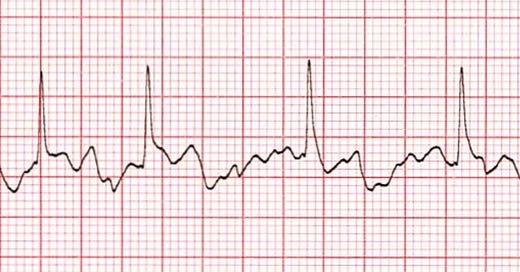Atrial Fibrillation ("afib") is a condition whereby the top part of the heart loses its regular, coordinated beating and contraction. The upper part of the heart begins to generate electrical activity in many areas of the top of the heart, resulting in an irregular heartbeat and a sensation of palpitations or decreased exercise tolerance. This situation may or may not be noticed by the individual. Often it is felt as irregular or strong heartbeats, sometimes very fast, and sometimes it remains within a normal range of heartbeats. However, one may only notice a little.
Atrial fibrillation is more common as one ages; there are many examples in the literature, and this graph represents the overall data.
Atrial Fibrillation is more likely to arise earlier in life if you have other exacerbating health problems. Things that increase the likelihood of atrial fibrillation include other heart diseases, particularly heart failure or valvular heart disease. Sleep apnea, diabetes, obesity, and high blood pressure all increase the likelihood of earlier onset of atrial fibrillation in one's life.
Generally, once someone develops a tendency for atrial fibrillation, that tendency and its subsequent risks remain (and possibly increase) throughout their life. Atrial fibrillation is primarily a bother, causing inappropriately fast or slow heartbeats, palpitations, and sometimes decreasing one's exercise tolerance. The worst thing about atrial fibrillation is that it can significantly increase a person's risk of stroke in some people. Palpitations may be a bother, but strokes really suck.
Suppose you notice irregular heartbeats, particularly episodes that last more than a few seconds (for hours or days). In that case, you should discuss an assessment with your doctor. Often a monitor for a few days or weeks can help detect afib. You want to catch afib if you have it. If you're at increased risk of stroke from the afib, you can significantly decrease that risk over time with proper treatment. The symptoms can often be improved if it bothers you in other ways. This entire assessment is individualized, and a complete evaluation and informed discussion should be undertaken with your physician.
The apple watch and some other devices may help screen for afib. This technology is changing and improving all the time. If you have questions about the current utility of these devices for your situation, a discussion with your doctor or cardiologist is helpful.
What causes afib? The general incidence increases with age. Afib may also indicate the presence of significant sleep apnea, high blood pressure, heart failure, diabetes, or obesity. All of these questions will go through your doctor's mind when you see them. A general look-over and tune-up are often in order if you develop afib.
How does one decrease the likelihood of getting afib? Keep fit, keep weight down, keep blood pressure optimized, exercise, all the things you know to do. If you have sleep apnea, get that corrected. Protect your lungs – don't smoke (anything), breathe healthy air, and avoid excessive dust and smog.
Further essays on the proper treatment will be forthcoming.
Best regards, and thanks for reading.
Robert Henson, MD
As always:
Medical Disclaimer
All information shared by Cardiology 123!sm, and Dr. Henson, such as his essay messages, images, advice, URLs, and any other material, is for informational purposes only and is not a substitute for professional medical advice, diagnosis, or treatment. Always seek the advice of your physician or other qualified health providers with any questions you may have regarding your health. Never disregard professional medical advice or delay seeking it because of something you have read here or elsewhere on the internet. In the final analysis, nothing supersedes expert, personalized care.




